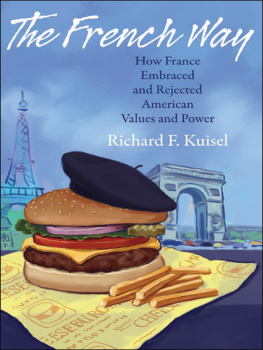Frances Got Talent:
The woeful consequences of French elitism
By Peter Gumbel
Frances Got Talent: The woeful consequences of French elitism
Copyright: Peter Gumbel
Published: May 15 2013
Originally published in France as
lite Academy enqute sur la France malade de ses grandes coles
ditions Denol 2013
Translation Peter Gumbel 2013
The right of Peter Gumbel to be identified as author of this Work has been asserted by him in accordance with sections 77 and 78 of the Copyright, Designs and Patents Act 1988.
All rights reserved. No part of this publication may be reproduced, stored in retrieval system, copied in any form or by any means, electronic, mechanical, photocopying, recording or otherwise transmitted without written permission from the author.
Provide me with people who can rule, not literary or witty types, scientists and inventors.
Napoleon,
Quoted by Hippolyte Taine in
Les Origines de la France contemporaine
Table of Contents
Preface to the English-language edition
France likes to think of itself as a meritocracy, a place where anybody from any background can reach the pinnacle of society by virtue of his or her intellectual prowess. The notion is one of the founding ideas of French republicanism. Its also a myth, as I outline in this essay, and one that has given rise to a pervasive culture of elitism that is damaging to the nation as a whole.
I wrote Frances Got Talent primarily for the French public, believing that it may not be aware of the extent to which the elitist culture it endures is anything but normal by international standards. This English translation is a faithful rendering of the French original, which was published by Denol in May 2013, with the title lite Academy: enqute sur la France malade de ses grandes coles.
For English-language readers not intimately familiar with the French education system, a brief explanation may be of use:
The school-leaving examination in France, usually sat at the age of 18, is the baccalaureate. There are several different types of bac, of which the most important is the general one. The others are vocational qualifications.
Many French young people then go on to higher education, but there are two very different tracks. The first leads through public universities, which charge almost no tuition fees and do not select their students at entry. Instead, they fail a very large number (overall, about half) after the first year. With the exception of law and medicine, which cant be studied elsewhere, public university is not a prestigious path to follow, and for graduates, there is nothing like the same affection for ones alma mater that is to be found in Britain, the U.S. or elsewhere.
The second track, however, is very selective and prestigious indeed; only about 5% of French students, those who have the best marks at school, manage to get on it. They will first spend two or three years in a so-called classe prparatoire a preparatory class that provides an intensive grounding either in hard sciences and mathematics or in the humanities. This is a highly stressful alternative to undergraduate studies. In my earlier book on French schools, They Shoot School Kids, Dont They ? I likened these classes to military boot camps. The students who survive them and there is considerable attrition will then go on to one of more than 200 grandes coles , which provide a two-year graduate education. Within this universe there is rigid hierarchy, and the competition to get into the most prestigious grandes coles, especially the Ecole Polytechnique, for science, or the Ecole Normale Suprieure, for humanities, is fierce. But the rewards for those who succeed are immense: a de-facto guarantee of professional success and security, and a fast track to the pinnacle of French society.
Its a system that is able to produce a tiny number of brilliant and charming men and women who constitute the ruling class. Whether they are competent as leaders is another matter. And as I argue, the entire selection process leaves the vast majority of the population frustrated, de-motivated or feeling discarded.
1. The Sons of Nothing
The first mourners gathered on the Place Saint Sulpice at midday, waiting patiently behind barriers set up by the police. They brought wicker baskets of lilies, or clutched a single white rose. Once allowed into the church, they quickly filled all 2,800 seats and crowded into the aisles between them. Even then, there wasnt enough room for all. Several hundred people remained outside in the cold April wind, listening to a broadcast of the ceremony through loudspeakers.
The hearse pulled up shortly after 3pm. Six pallbearers lifted out the coffin containing the autopsied body of Richard Descoings, the charismatic and controversial director of Sciences Po, who had been found dead in his New York hotel room eight days previously, at the age of 53. They hoisted it on their shoulders and walked solemnly up the steps of the portico, through the wooden double doors and down the nave. The widow, her face covered in a black veil, walked unsteadily behind them, clutching the arm of a friend. Looking down on the scene were huge portraits of Descoings that hung on either side of the altar and on the columns of the portico outside. Taken from a photograph the day before his death, they showed him engrossed in conversation, his eyes ringed with tiredness but still alert, his hands raised expressively in front of him. The giant icons suggested a personality cult.
I stood at the back of the church and watched the scene with mixed emotions. I had been teaching at Sciences Po since 2005, and worked closely with Richard Descoings in the last five months of his life, serving as the institutions director of communications. It had been a strange and stressful experience. Mired in a scandal that discredited his management of the institution, he became moody, withdrawn and almost impossible to work with. The staff at Sciences Po who had long venerated him turned against him. The outside world, which he had avidly courted, backed away in embarrassment.
Then, suddenly, the crisis seemed to have been forgotten. His death unleashed a wave of public emotion of the sort usually reserved for Hollywood stars. On the night of the announcement of his death April 3, 2012 hundreds of students held an impromptu wake in the main Sciences Po building at 27, rue Saint-Guillaume. They lit candles, expressed their grief on Facebook, or scribbled condolence messages on scraps of paper that they left on trestle tables set up in the entry hall of the school. He was our Dumbledore, read one, referring to the watchful director of the wizardry school from the Harry Potter series. Thank you for changing my life, read another.
The paradoxes were striking. The man being buried had styled himself as a maverick, a heretic even, yet he was being buried with full honors at a traditional Catholic Mass. He was the director of a school that is an almost obligatory rite of passage for ambitious youngsters and which has educated five of the seven presidents of the Vth Republic, yet he had forged a reputation as someone who disdained the elitist culture and had taken important steps to change it. Looking through his CV, however, it was evident how important status was for him personally: he sat the competitive entrance exam for the Ecole nationale dadministration (ENA) not once but three times before he succeeded. In his funeral eulogy, the political scientist Olivier Duhamel paid tribute to the way Descoings had sought to diversify Sciences Po, a school that is very largely reserved for the economic and intellectual elite, or to put it clearly, a place largely reserved for the sons of the bourgeois and the children of teachers. And, to borrow a line from a Jacques Brel lyric, he opened it up to the sons of nothing.
Next page













